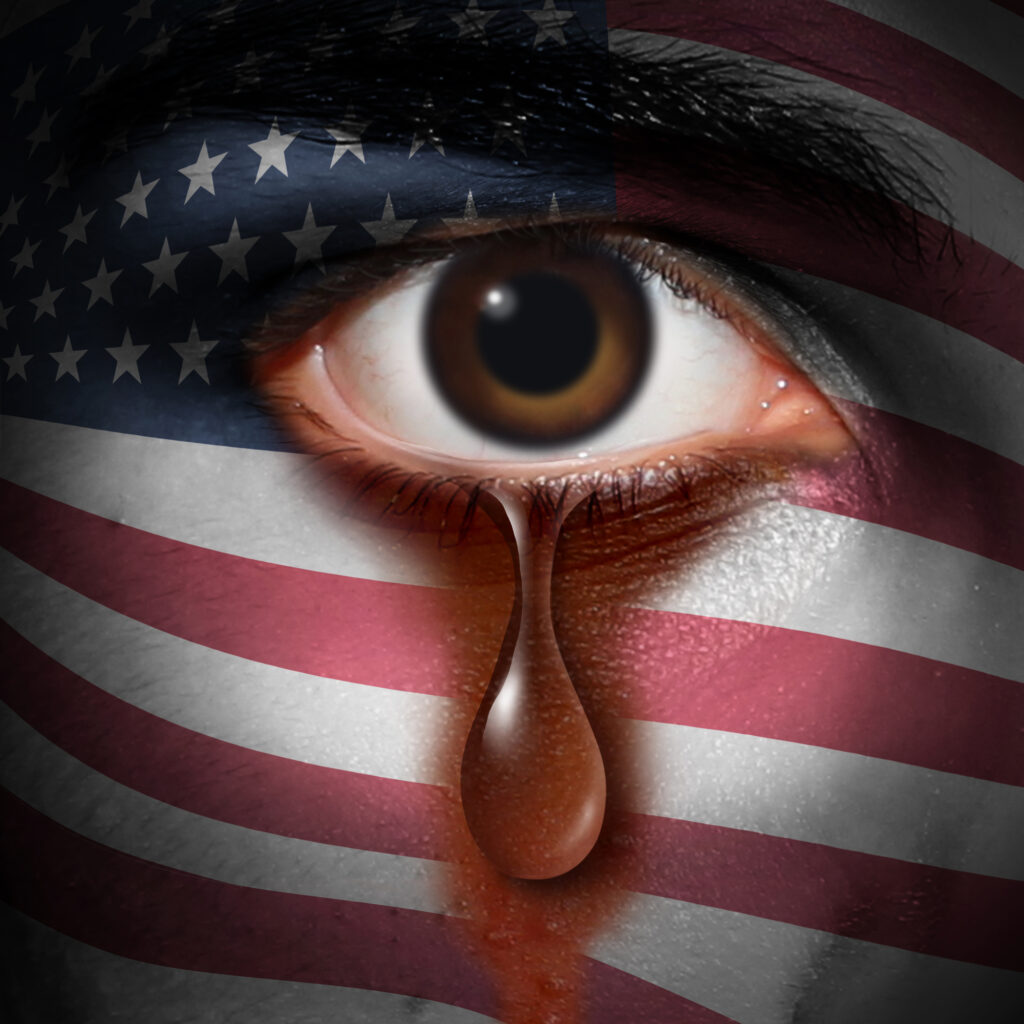How easily we blame others for our shadows. The boundary between wholeness and alienation runs straight through our hearts, through our consciences, through our beliefs and our actions. But the force of a contrary understanding is winning the day. It was Rousseau the one who started the modern “Age of Alibi”, its precursor being Adam who blamed God; “That woman you gave me…” Rousseau placed the origin of human corruption in the social order—he was the first to propagate the idea of “structural oppression” later given formal analysis by Marx and recently becoming the central tenet of the racialist ideology.
We are good, society corrupts us is the substance of the modern understandings of history and social reality in America. If we fail to achieve the state of nirvana from where we claim to have been unjustly removed, we find an alibi —evil forces lurking around and planning against us are the culprit. Powers beyond our control prevent our integral fulfillment.
The task of self-discovery is further complicated when actual historic wrongs have been inflicted on a group. As one can always point out to the historic fact of injustice, we can always trace back our present demise to that original sin and deny the possibility of meaningful agency. Calling for an alternative explanation where we have meaningful autonomous social space is easily dismissible as an instance of blaming the victim. The perennial question of race and racism today remains parasitic to ignorance of the primary source of our problems, the abandonment of a sound anthropology able to us toward sound social understanding.
But, as it remains the case that the matrix of social understanding in the here and now runs through the heart of every life lived, we can easily engulf ourselves in a vicious cycle of victimization, one that some scholars have called the utopian syndrome. A utopian is one who sees a solution where there is none and one who favors extremism in the pursuit of that solution. Once one believes to have found the ultimate explanatory element for a condition, the resulting behavior is what we call the utopian syndrome. Interestingly, the opposite to the utopian syndrome is the “terrible simplicateur”, the one who never sees a problem. There are many simpletons who disregard the question of race as a mere fabrication of leftist ideologues or as a historical datum devoid of present relevance. The problem is that both the utopian and the simpleton disregard anyone who dares to detract from their paradigms. The easy accusation against those who dare to question their pattern is that of being “ignorant” by complicating the obvious or by disregarding the momentous.

The utopian syndrome has had three main expressions. The first is self-pity, where people feel sorry for themselves and invite commiseration—a “poor me and damn them” stance. The second is nihilism. A nihilistic life is where immediate gratification as a way to “opt-out” of society into a world of ecstasy and momentary euphoria (sex, drugs, petty crime) is a common expression of the syndrome. The third expression is rabid activism. Rabid activism has become the main political expression of the syndrome and has many engaging on a virtuous crusade to destroy the source of the problem, “them.” Grabbing the higher ground of the concept of justice, the activist has a “by any means necessary” attitude whereas the pursuit of radical changes justified about any action. Radical movements and even terroristic actions can grow out of this expression.
But there is a milder form of this third utopian expression. Most people do not become fervent activists but end up aligning with a vision of the problem shaped by the assumptions of the activist. They do not descend head on into the world of fervent mobilization but become a vanguard that offers activism an imprimatur. This type of stance is projective, a moral stance of righteous indignation that claims special insight—based on the conviction of having found the all-encompassing truth. The adherent to this mild-mannered activism engages the problem of race not as an attempt at analyzing it but as a proselytizing and pedagogic crusade. Consequently, those who do not embrace their insights must be benighted, must be acting on bad faith, must be currying favors with “them”, or must be the sad sufferers of unsolvable ignorance.
The prevailing answer to the question of race is built this mild mannered form of the activist utopian syndrome that has a whole group of people buying into the affirmation that the ultimate explanatory element for the problem of race today is “white supremacy.” This element serves to interpret the roots of our founding as a nation, the history of American racism, and the present problems of our people. Any detraction from that fundamental matrix of understanding is a failure to empathize with a struggling people, a failure to understand and a denial of the problem. Any detraction is seen as a form of the aforementioned “simplifier”, a simplistic and ignorant explanation serving as a justification to deny the full humanity of non-whites.

In effect, the premises for the explanation have become more real than reality itself. Reality must conform to the premise, as there is no other way that it could be. Let’s hammer the premise in! The 1619 Project is a very influential campaign built on the mild-mannered utopian syndrome whereas the very existence of our society is presented as having its inception and its continuation in the sin of racial oppression. That sin is said to be ingrained in the very fabric of the nation and can only be extirpated by a renunciation of the values that formed the basis of our republic. That renunciation is presented as a cleansing when in reality it is based on a radically different conception of social being. It keeps alive the “Age of Alibi,” as we remain innocent victims of Americanism and prevents us from fully embracing our subjectivity as persons with the radical capacity to change our condition through our choices.
There are no real choices as long as we don’t discover the truth about the foundations of what needs to be burnt to the ground. In the end, it makes us victims of forces outside of our control as long as we remain within the sphere of the “white supremacist” ethos. Of course, the revolution will not effect without a reaction—a synthesis cannot emerge without an anti-thesis. The reactionary terrible simplificateur is the response, “Get over it! Racism is over. It is only in your head. In fact, blacks are more racist now.”
We are drowning as a nation between these two destructive narratives missing the necessary balance to become effective change agents. I came across this unbalanced approach upon arriving to America and found myself often warned to expect a negative experience, when I was advised to beware of the whites (yes, “them”) and when I saw that the law itself already had built-in “remedies” for my discrimination. I was told that Zi belonged to “protected communities,” as if our people were an endangered species arranged in a taxonomy. This is why discussions on what “really happened” in a given case involving race are unproductive. In reality, they are not much more than gambles for power. There is nothing to learn from them. We supposedly “already know” that the nature of our society is intrinsically racist, built intentionally for the purpose of perpetuating white dominance. Or, on the flip side, we “already know” that nothing happened, and the media is just arranging things to perpetuate the narrative of racism.
How to get out of this destructive false dualism? In fear and trembling but with courage. We must also see the futility of attempting at a solution within the frameworks of false and unrealistic alternatives. I am aware that my proposal is the one considered unrealistic, but false closed systems reject anything not in their orbit. As we are not utopians, nothing anyone can propose is going to be a facile or comprehensive alternative, only a signal in the right direction for a thorny journey. I am convinced that the great new step of an authentic civil rights movement begins with severing our destiny from the clutches of race-consciousness, where race is seen at central to our very existence.
The rediscovery and embrace of our individuality as persons (notice, as persons, not as islands unto ourselves) is the main first step. The second, is a return to an understanding of the civil rights movement as being within the affirmation of the values and principles of the Christian understanding of natural law as embedded in the Declaration of Independence. Our recognition of blacks as quintessentially American, not Africans in diaspora.
About the Author
Ismael Hernandez, is president of the Freedom & Virtue Institute, an organization dedicated to the promotion of the ideas of liberty, faith, and self-reliance. Ismael is a regular lecturer with the Acton Institute in Grand Rapids, Michigan, and has spoken at Heritage Foundation, the Cato Institute, the Foundation for Economic Education and many other organizations. He is a regular speaker at service clubs around the country and is the author of the acclaimed book Not Tragically Colored: Freedom, Personhood, and the Renewal of Black America. He is a noted expert on questions of effectively serving the poor and race relations. Ismael is also the host of the podcast Freedom & Virtue – The Podcast, available on iTunes, Spotify and RSS feeds.


